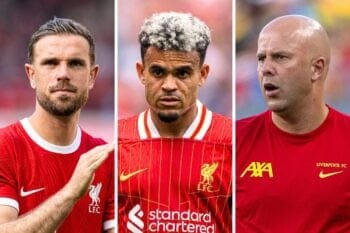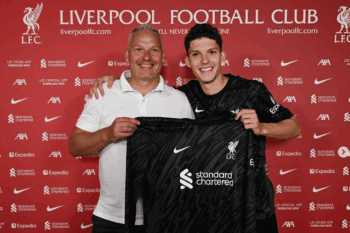
Yet again, following events at Anfield this past weekend and the well-publicised shenanigans of a certain Wayne Rooney the week previous, the use of post-match video technology seems to be one of the hot topics of conversation again.
So the question is do we embrace it fully and allow the Football Association to punish events that happen in games afterwards and cause even more furore amongst fans or do we simply disregard video evidence completely from the disciplinary equation, once and for all?
Well, the very simple answer is that there is no simple answer!
Every one of us will be able to cite at least one offence in a match that should have received some form of punishment but was missed by match officials. The majority of us could also easily bring to the fore an incident that deserved far greater punishment than the wafting of a piece of yellow coloured card in front of the protagonist by a referee. And I am equally confident in the fact that most of us will be able to remember ‘the one that got away’ But is retrospective video technology and punishment thereby the answer to the problem of getting a near ‘perfect’ refereeing performance or something that should be left firmly in the television studios in the hands of the various ‘expert’ pundits that now grace our living rooms?
For on one hand, who can argue that Wayne Rooney’s elbow smash on Wigan’s James McCarthy didn’t deserve anything but a red card? The award of a free kick for the offence by Mark Clattenburg on the basis of asking Rooney himself what had happened was nothing short of farcical. Wayne Rooney was never going to turn to Clattenburg and admit to what he had done so why even ask him?
McCarthy was not in a position to offer an explanation due to him seeing the proverbial stars floating around his head, a la Disney animation style, so what else could or should Clattenburg have done?
By awarding the free kick, Clattenburg stopped the F.A from looking at the offence retrospectively and punishing Rooney with what would have been a certain three game domestic ban, as the referee had seen with and dealt with the offence ‘appropriately’ at the time.
The very same argument can be used for Jamie Carragher’s awful lunge on the ‘emotionally unstable’ Luis Nani in the game at Anfield yesterday. The challenge was arguably worth a red card, although Nani has done himself no favours this season with his continual theatricals every time the merest physical contact comes his way.

A quick search on YouTube brings up a plethora of examples of ‘play-acting’ by the Portuguese winger and his continual act of going to the floor, rolling around a few times and then making a recovery from his life threatening ‘injury’ that would baffle even the most ardent believers, is starting to get as nauseous as it is tiresome.
Manchester United’s young full-back Rafael was also extremely fortunate to stay on the pitch after his nasty, nasty two footed, knee high ‘tackle’ on Lucas. The only saving grace was that Lucas saw the challenge coming and managed to avoid contact and in the process probably a broken leg, such was the ferocity and careless nature of the tackle.
These are but three very recent and high profile examples of situations where retrospective video evidence could quite easily be used and offending players punished accordingly, if the rules allowed it to be so.
On the flip side to even the three situations highlighted above, there is the train of thought that retrospective action does not offer any reward to the teams that are ‘victimised’ by the offences. Banning Wayne Rooney for three games after the event would have been of no benefit to Wigan Athletic’s chances of winning their game against Manchester United, nor will the risk of bans for Rafael or Carragher have helped define the outcome of the game between Liverpool and Manchester United yesterday.
There is a notion that retrospective action might hinder a particular team’s chance of success in subsequent games but it certainly does not hinder them in the games that the offences were committed in and that is always going to be a bone of contention when it comes to the benefits of retrospective disciplinary action.
With respect to the teams I’m about to mention, Manchester United losing Wayne Rooney for games against West Brom, West Ham and Wolves, for example, would not have the same impact as being down to ten men away at Wigan. Even Rooney missing games against Arsenal or Chelsea would not be as bad a punishment because Manchester United would be able to start those games with eleven players, regardless of whom the eleven were.
I feel that video evidence has to have a place in the life of football in the twenty-first century, if to do nothing but correct a potential miscarriage of justice where a player is banned from matches for an offence he did not commit; or if a referee has misjudged an tackle, say, and wrongly sent off a player.
Personally, I would favour going the whole nine yards and let the Football Association review events after the game on request from clubs but with a caveat: That each club gets an allotted amount of ‘evidential video reviews’ per season that can be used to defend their players against punishments already meted out by match officials and also to cite opposing players for offences that would have been punished if seen by referees.
I would suggest having five reviews per club, per season for example and then if an appeal against a red card that was issued to a player is successful, the club keeps their allotted amount of ‘reviews’ but obviously loses one of their five if the appeal is unsuccessful. Having only a finite amount of reviews available will help stop frivolous appeals being made to the Football Association and also make clubs think clearly about the use of appeals, especially at the start of the season.
As things stand however, all that video evidence currently seems to do is provide fans with plenty of ammunition for the verbal sparring that goes on between rival fans that starts upon their return to work on Monday morning and this is the worst position of all.
















Fan Comments